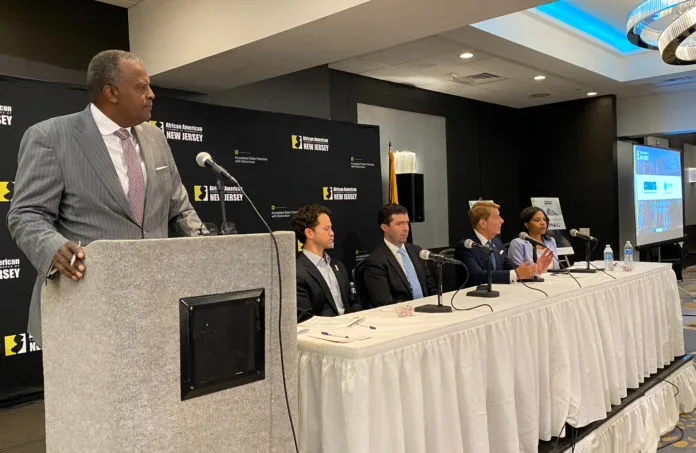
How wrong is it that fewer than 2% of all venture capital dollars go to Black entrepreneurs, fewer than 2% goes to Latino entrepreneurs and fewer than 1% goes to women of color … we’ll let Tim Sullivan, the CEO of the New Jersey Economic Development Authority, count the ways.
It’s wrong — morally wrong, he started.
It’s bad for job creation, too, he added.
Picking up steam at Thursday’s Business Leadership Conference sponsored by the African American Chamber of Commerce of New Jersey, Sullivan didn’t hold back.
It’s stupid, he said.
That’s why New Jersey is doing something smart.
In fact, in regard to this issue, it has been throughout Gov. Phil Murphy’s administration — with programs specifically targeted to entrepreneurs from communities that clearly are not getting access to the money tree. Even programs open to all have additional incentives for members of those communities.
Then, there’s the $20 million Black and Latino Seed Fund, which also is pouring money into these communities.
On Thursday, the EDA announced an additional step: the creation of the Diversity Finance Advisory Board, which will work to increase access to institutional capital for women- and minority-owned startups.
The board will provide knowledge, guidance and insights on ways to best increase capital, access and investments in New Jersey’s diverse entrepreneurs.
Sullivan said he hopes it’s another smart step to right a wrong.
“Across the nation, women- and minority-owned startups have not benefited from the increase in venture capital investments that white-owned startups have experienced,” he said. “The Diversity Finance Advisory Board aims to rewrite that narrative and ensure New Jersey-based diverse entrepreneurs have equitable access to institutional capital.”
The EDA announced the 10-member board that will serve in 2023-24:
- Desiree Castillejos, Hunter Industries
- Vaughn Crowe, Newark Venture Partners
- Stephen Cammock, GCM Grosvenor
- Robert Johnson, Gibbons Law
- Gary Mann, Jasfel Analytics
- Obie L. McKenzie LLC, BlackRock (Retired)
- Yolanda Plaza-Charres, Argonautic Ventures
- Jeffrey Robinson, Rutgers University – Newark
- Annie Seelaus, R. Seelaus & Co., Inc.
- David Stengle, Board ++
Like any good DEIB program, intentionality was a part of the selection process, the EDA said.
To serve on the board, members must have a strong New Jersey nexus and demonstrate institutional development, investment or policy experiences, the EDA said. Additionally, members must show a commitment to, and have experience in, the development of diversity, equity & inclusion policies.
The EDA said it will continue to add and supplement the initial advisory board members.
Here’s how it will work.
The DFAB, in collaboration with EDA staff, will work to develop and implement a holistic product set that will help make New Jersey a national leader in diversity finance. Board members will also work to develop a private-sector engagement framework to identify and engage the state’s private capital sources.
Additionally, board members will help establish partnerships to support the EDA’s mission to grow high-quality jobs, catalyze investment and foster inclusive community development.
John Harmon, the founder and CEO of the African American Chamber — and someone who has long pushed for an equal playing field, nothing more — said the more, the merrier. He obviously was thrilled.
“Our state has put forth a strategy that has the potential to have a transformational impact on the competitiveness of New Jersey,” he said. “Moreover, today’s announcement could lead to a more level playing for woman- and minority-owned businesses whose vision and proposed plans to establish a successful enterprise can now be realized. This is a positive step towards a more equitable future for New Jersey.”
Jayné Johnson, director of the Governor’s Office of Diversity, Equity, Inclusion & Belonging, called it a win-win.
“Black and Latino communities face longstanding barriers, including those that limit their access to capital, yet these communities remain incubators of ingenuity and innovation,” she said. “NJEDA’s Diversity Finance Advisory Board advances the administration’s efforts to increase access and opportunity for historically underrepresented entrepreneurs, and supports our state’s innovation economy by engaging women, Black and Latino entrepreneurs in the venture capital market.
“Our state’s competitive edge is strengthened when promising, new business startups are equipped to succeed.”
Is this the last step toward equity? Don’t be silly.
Sullivan was quite clear on that, too.
While he said there have never been more resources and programs and tools available across the government, he knows challenges remain. He’s ready to hear him.
Call the EDA, call the Business Action Center — call anyone, Sullivan said.
“There’s no wrong door, we’ll figure out how to help,” he said. “And, if you’ve got use for other kinds of programs and resources we should be thinking about, call us up.
“This administration has a pretty good report card on listening and standing up new programs and trying new things because we know we’ve not, by any means, cracked the code and solved all the problems.”



